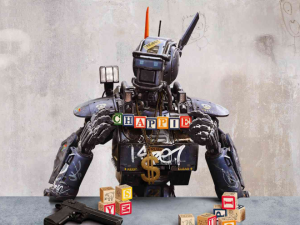
★★☆☆☆
Director Neill Blomkamp’s latest sci-fi work, “Chappie,” explores a futuristic world patrolled by a robotic police force. Blomkamp’s creative yet realistic cinematography and original storylines in past projects within the genre — namely “Elysium” and “District 9” — made his newest film a highly anticipated one. Unfortunately, “Chappie” didn’t quite deliver the whole package.
The film’s plot revolves around efforts to undermine this robotic police force, efforts which ultimately focus on one robot whose unique program has given it the ability to think and feel like a human. The film chronicles a skewed struggle for authority as attempts to both destroy and save the robot quickly escalate.
The film is constantly weighing the consequences of that age-old science fiction question: how would artificial intelligence affect society and humanity as a whole? From “I, Robot” to “Transformers,” there has been a slew of films dedicated to this theme.
Chappie, the robot programmed to feel and think like a human, is placed in an environment that causes it to become an unlikeable character. At first, one wants to relate and connect with Chappie and support its human-like development. However, when it is stolen by a group of narcotic-dealing criminals, its intellectual growth becomes distorted. Chappie speaks in slang and is taught to act like a criminal. Ultimately, one begins to feel sorry for the robot as it is deceived into killing innocent humans and performing illegal actions. It is clearly both abused and confused, which makes its maturation almost tragic (but doesn’t quite elicit any meaningful level of sympathy).
With Chappie and its counterparts being rather unlikeable, one hopes that their opposition would be worthy of support. However, this is not the case. The villain-esque character, Vincent Moore (Hugh Jackman) fails to have any redeeming qualities. He continually works to undermine the police force and is the mastermind behind the city’s widespread rebellion, but he still leaves the audience still in search of a more multifaceted character to favor.
The only character that elicits some compassion is the intellectual genius who created the robots and crafted the program that produced Chappie. Deon Wilson (Dev Patel) yearns for genuine interaction with his creation. Unlike the other people in the film, his motivations have no malevolent intent, as he merely wants to help Chappie reach its potential. Nonetheless, his plight persists until the very end of the movie, at which point the robot has already developed a consciousness based primarily upon the lifestyle of a convict.
Although a film does not necessarily need its characters to live beneficial lives, it should make its audience form some sort of connection or have a vested interest in the protagonists. The fact that “Chappie” features an excessively manipulated robot makes it difficult for any meaningful relationships to be made. Even when the robot shows true compassion for its partners in crime, it is hard to feel anything other than sadness for how much it has been deceived, but any feelings of pity or sadness are immediately dissolved once the robot returns to its unlawful ways. The viewer is left wanting to like the robot but being unable to.
Although the movie fails to resonate with the audience, there are other elements to consider. The musical score is one of the high points of the movie. Electronic-based tracks with inherent dissonance perfectly complement the action of the film. The music helps bring scenes to life, and the background beats build up tension and actually enhance the visual experience.
Another positive attribute of the film is its use of computer-generated imagery. With the movie’s plot revolving around computer-generated robots, their detail is of paramount importance. Fortunately, the movements and individual characteristics of the robots in “Chappie” do not at any point appear to be clearly fabricated. This enables the viewer to focus on the other qualities of the movie without constant distraction. These visual enhancements in many regards serve as the saving grace of otherwise disjointed visual imagery.
As far as action-packed films involving robotic life forms go, “Chappie” fails to measure up. Even its exciting special effects cannot mask the gaping inconsistencies pervasive throughout the plot and themes of the film. The back-and-forth struggle between two unlikeable powers to manipulate an innocent robot lacks appeal. “Chappie,” in terms of both the movie and the robot, harbors a wealth of potential that unfortunately it is not able to fully grasp.














